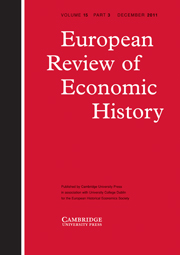Article contents
Swedish historical national accounts: The fifth generation
Published online by Cambridge University Press: 08 October 2003
Extract
The study of economic growth is arguably the central object of economic history. Our most comprehensive measure of economic growth relies on historical national accounts (HNA). The theoretical underpinnings of present day national accounts have evolved since the first attempts by Gregory King in the seventeenth century and have now become standardised according to the rules of the UN's system of national accounts (SNA). Though grounded in economic theory the SNA system rests in many cases on quite arbitrary definitions that are far from obvious or involve theoretical inconsistencies, as has been pointed out for example by Eisner (1988) and Shaikh and Tonak (1994). This arbitrariness concerns such issues as how to draw the boundary between economically productive activities and forms of private and social consumption, how to account for non-marketed economic activities and how to handle the ‘services’ provided by durable goods.
- Type
- Research Article
- Information
- Copyright
- © 2003 Cambridge University Press
- 10
- Cited by




